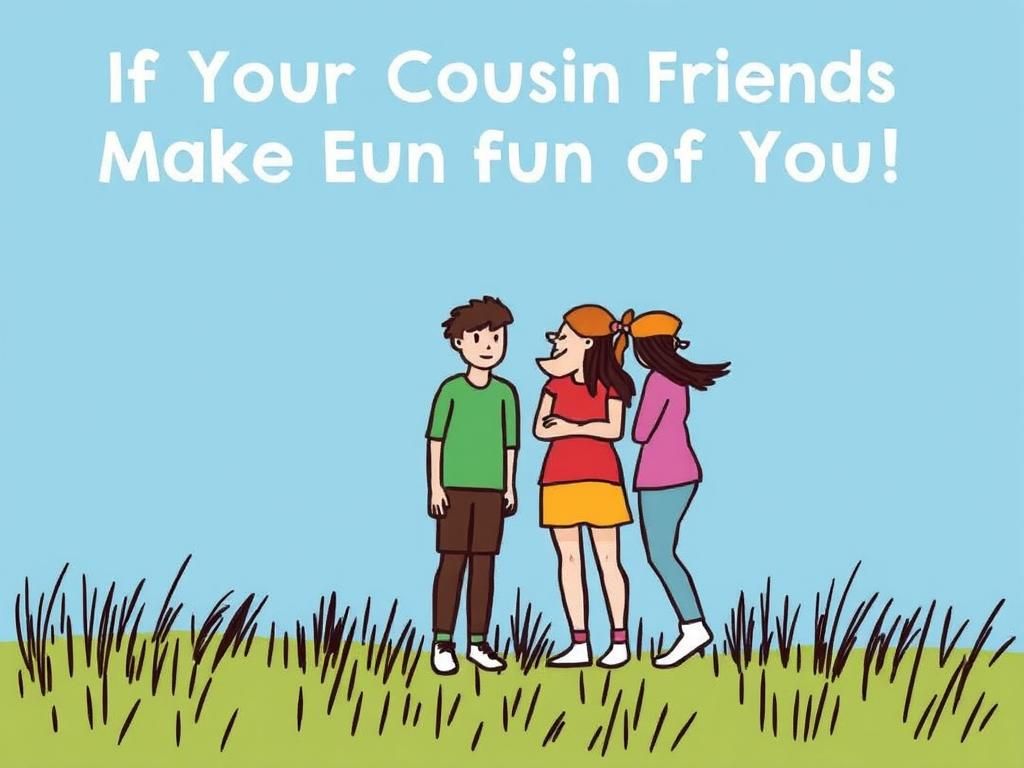Being teased by someone, particularly a family member’s friends, can be an emotionally charged experience. If your cousin friends make fun of you, it can lead to feelings of confusion, hurt, isolation, and even long-lasting impacts on self-esteem. The dynamic between you, your cousin, and their friends can complicate matters further, and it’s essential to understand this context to constructively address the situation. This article will delve into various aspects of being teased, why it might occur, the emotional impacts, strategies for coping, and when seeking professional help may be appropriate.
Understanding the Dynamics
The Role of Cousin’s Friends in Family Relationships
Family structures are often intricate, and friends of family members can play a pivotal role in shaping the interactions within these dynamics. If your cousin’s friends make fun of you, it showcases how external relationships can influence familial bonds. Their behavior can impact your relationship with your cousin as well, creating tension or discomfort within family gatherings. Often, these friends are seen as an extension of your cousin’s social life, and their opinions can unwittingly affect your standing within the family.
Common Reasons for Teasing or Bullying
Teasing can frequently stem from a variety of reasons. It’s crucial to recognize that often, those who tease may be acting from their own insecurities or needs for validation. Such social behaviors appear prevalent within peer groups and can manifest as a misguided attempt at humor or bonding. Understanding that their actions might not stem from a place of malice but rather from a desire for social acceptance can help in coping with the situation.
Emotional Impact of Teasing
Recognizing Your Feelings
When your cousin friends make fun of you, it can often leave you grappling with your emotions. You may experience confusion about whether their teasing is meant in good fun or if it holds a more hurtful edge. This hesitation can create a sense of isolation, making you feel left out from both your cousin’s circle and your own family.
Long-term Effects on Self-esteem
The emotional toll of being teased can influence self-esteem significantly. If left unaddressed, these experiences can lead to developing insecurities that hinder social interactions in the future. You might find yourself second-guessing your value in social situations or wrestling with self-doubt, which can further affect your close relationships.
Analyzing the Behavior
Is It Light-Hearted Fun or Bullying?
One of the most critical steps in addressing the situation is to differentiate between harmless teasing and bullying. Light-hearted fun might involve playful jabs aimed at mutual understanding, while bullying is characterized by a consistent pattern of derogatory comments meant to harm. Recognizing the signs that the teasing has crossed into harmful territory—such as persistent belittling or exclusion—is essential in determining your next course of action.
Understanding Motivations

Understanding why some individuals engage in teasing can aid in processing their behavior. Often, individuals who tease might be projecting their insecurities or attempting to gain popularity within a group. Grasping this underlying motivation can provide relief by reminding you that their behavior reflects more on them than it does on you.
Strategies for Coping
Self-Reflection
One of the most powerful coping strategies is self-reflection. It’s vital to reassess your self-worth and remind yourself that you are deserving of respect and kindness. Journaling feelings and reactions to the teasing can provide clarity on what impacts you most and how best to address those feelings.
Communication Techniques
Addressing the issue directly with your cousin can be a constructive step. Engage in a calm conversation where you express how their friends’ comments make you feel. Additionally, incorporating humor to deflect negativity may ease the tension and mitigate future teasing. Setting clear boundaries around acceptable behavior can help cement your stance against hurtful remarks.
Seeking Support
Don’t hesitate to reach out to trusted family members or friends about your experiences. Engaging in conversations with those who care about you can help validate your feelings and might even offer insights into similar situations they’ve faced. Furthermore, finding mentors or counselors can provide additional guidance and support as you navigate these emotional challenges.
Turning Teasing into Positive Experiences
Developing Resilience
Building resilience is a crucial skill when faced with teasing. Equip yourself with techniques that help strengthen your emotional armor, such as practicing mindfulness or developing healthy coping mechanisms. Learning to laugh at yourself without plunging into self-deprecation can further allow you to engage with your emotions positively, fostering personal growth from challenging interactions.
Fostering Positive Relationships
Try to diversify your social circles by building new friendships outside your cousin’s friend group. Engaging in activities that put you in touch with like-minded individuals can boost your confidence and offer supportive relationships, shielding you from negative interactions. The more connections you build, the more perspective you’ll gain about your worth.
When to Seek Help

Signs That Professional Help is Needed
While addressing teasing on your own can be empowering, there are situations when professional help becomes necessary. If you find yourself grappling with persistent feelings of sadness or anxiety, or you begin avoiding social situations altogether, it may be time to consider seeking help from a therapist or counselor.
Resources and Support Networks
There are numerous resources available to individuals dealing with the emotional fallout from teasing. Hotlines, counselors, and community support groups can provide assistance tailored to your needs. You might also delve into self-help books or online resources to gain deeper insights and coping strategies.
Conclusion
In navigating the realities of teasing, especially if your cousin friends make fun of you, understanding the dynamics at play is vital. By employing effective strategies, you can reclaim your self-worth and foster positive relationships that support your emotional health. Ultimately, everyone deserves respect and understanding, and standing up for yourself is a critical step toward ensuring that you receive it.
| Key Strategies | Description |
|---|---|
| Self-Reflection | Assess your self-worth and document feelings. |
| Effective Communication | Address teasing calmly; set boundaries. |
| Build Resilience | Practice mindfulness and positive humor. |
| Seek Support | Talk to trusted individuals or professionals. |
FAQ
What should I do if my cousin’s friends continue to tease me?
Consider addressing the behavior directly with your cousin and their friends while setting clear boundaries regarding acceptable behavior.
Is teasing always harmful?
No, not all teasing is harmful. Light-hearted humor among friends can promote bonding, but it’s essential to recognize when teasing becomes hurtful.
How can I communicate my feelings effectively?
Try using “I” statements to express how the comments make you feel without sounding accusatory (e.g., “I feel hurt when…”).
What can I do if I feel anxious or sad about teasing?
Talk to someone you trust or reach out to a mental health professional who can help you cope with these feelings.
How do I distinguish between light-hearted teasing and bullying?
Light-hearted teasing is usually reciprocal and not intended to harm; bullying is persistent and meant to hurt.
Are there any resources available for help?
Yes, many hotlines, counselors, and online resources can offer support for dealing with teasing and its effects.
How can I build resilience against teasing?
Develop coping strategies such as mindfulness, humor, and strong social connections.
Should I confront my cousin about her friends’ behavior?
Yes, addressing the issue can create awareness and prevent further hurtful behavior.
What if the teasing leads to more serious bullying?
If the teasing escalates to bullying, seek support from trusted adults or professionals immediately.
Can I report bullying if it occurs at school or online?
Absolutely. Most schools have policies to handle bullying effectively and ensure a safe environment for all students.